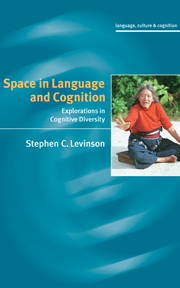Book contents
- Frontmatter
- Contents
- List of figures
- List of tables
- Preface
- Acknowledgements
- 1 The intellectual background: two millennia of Western ideas about spatial thinking
- 2 Frames of reference
- 3 Linguistic diversity
- 4 Absolute minds: glimpses into two cultures
- 5 Diversity in mind: methods and results from a cross-linguistic sample
- 6 Beyond language: frames of reference in wayfinding and pointing
- 7 Language and thought
- Notes
- List of references
- Language index
- Author index
- Subject index
2 - Frames of reference
Published online by Cambridge University Press: 03 December 2009
- Frontmatter
- Contents
- List of figures
- List of tables
- Preface
- Acknowledgements
- 1 The intellectual background: two millennia of Western ideas about spatial thinking
- 2 Frames of reference
- 3 Linguistic diversity
- 4 Absolute minds: glimpses into two cultures
- 5 Diversity in mind: methods and results from a cross-linguistic sample
- 6 Beyond language: frames of reference in wayfinding and pointing
- 7 Language and thought
- Notes
- List of references
- Language index
- Author index
- Subject index
Summary
THE CONCEPT OF A SPATIAL FRAME OF REFERENCE
The notion of ‘frames of reference’ is crucial to the study of spatial cognition across all the modalities and all the disciplines that study them. The idea is as old as the hills: medieval theories of space, for example, were deeply preoccupied by the puzzle raised by Aristotle and mentioned in Chapter 1, the case of the boat moored in the river. If we think about the location of objects as places that they occupy, and places as containing the objects, then the puzzle is that if we adopt the river as frame of reference the boat is moving, but if we adopt the bank as frame, then it is stationary (see Sorabji 1988: 187ff.).
But the phrase ‘frame of reference’ and its modern interpretation originate, like so much else worthwhile, from Gestalt theories of perception in the 1920s. How, for example, do we account for illusions of motion, as when the moon skims across the clouds, except by invoking a notion of a constant perceptual window against which motion (or the perceived vertical etc.) is to be judged? The Gestalt notion can be summarized as ‘a unit or organization of units that collectively serve to identify a coordinate system with respect to which certain properties of objects, including the phenomenal self, are gauged’ (Rock 1992: 404, my emphasis).
- Type
- Chapter
- Information
- Space in Language and CognitionExplorations in Cognitive Diversity, pp. 24 - 61Publisher: Cambridge University PressPrint publication year: 2003
- 1
- Cited by



